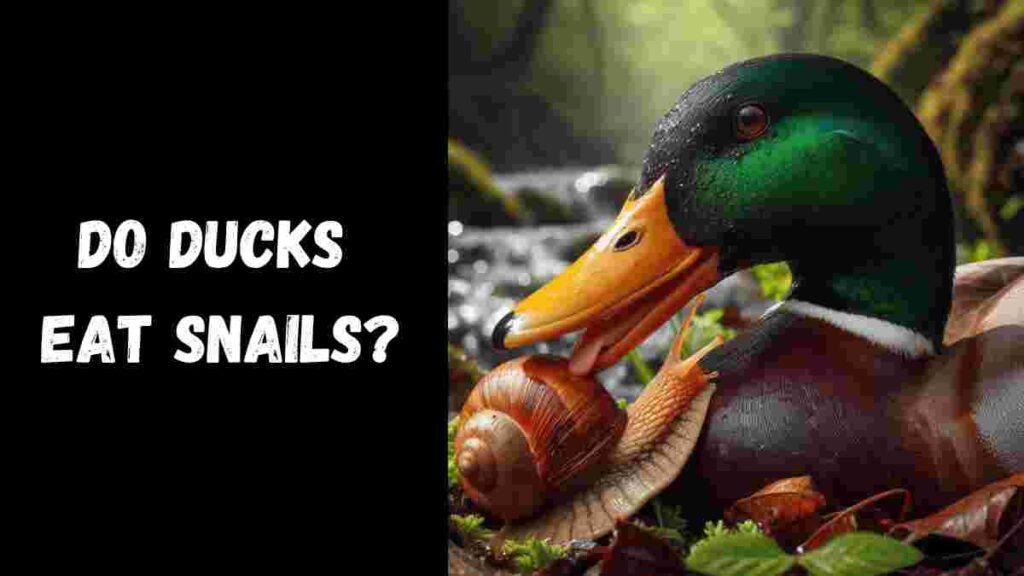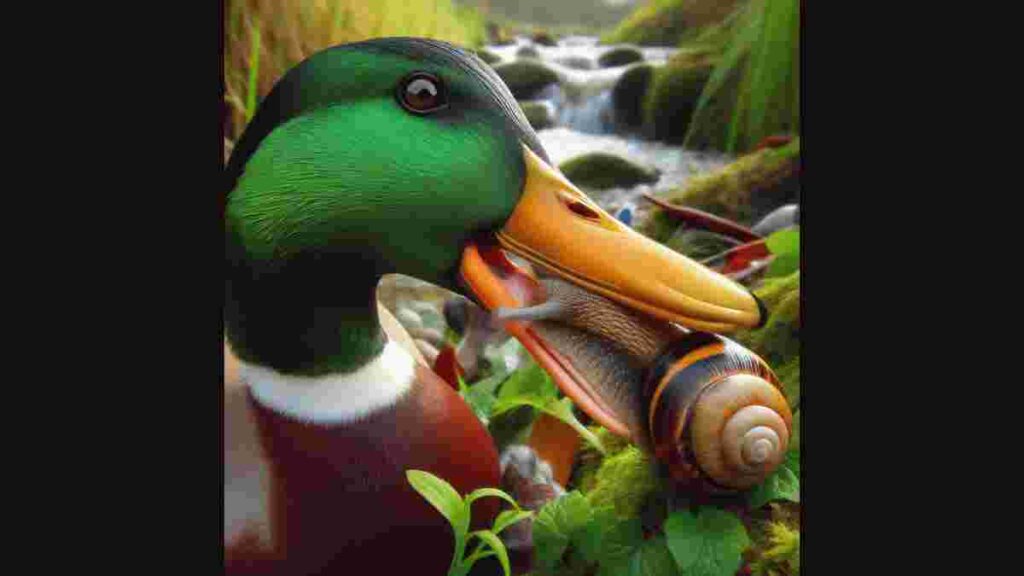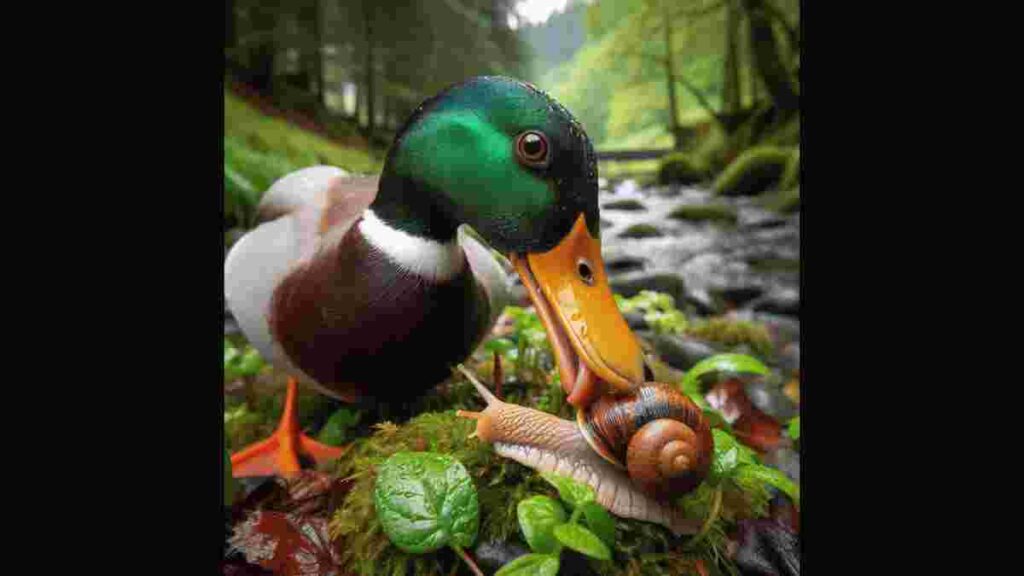Do Ducks Eat Snails: For those familiar with the rustic charm of a country pond or the tranquil elegance of a city park, the sight of ducks bobbing on the water or waddling across the grass is a common delight.
Birdwatchers and animal enthusiasts often wonder about the dietary habits of ducks. One of the most peculiar questions that arise is whether these feathered friends of ours consume snails.
In this article, we’ll quack our way through the intriguing interplay of ducks and these mollusks, shedding light on duck foraging behaviors, the ecological impact of their diet, and the role of ducks in natural pest control.
Amazing Wooden Duck Houses At Reasonable Cost

Table of Contents
Do Ducks Eat Snails?
Before we dip into the specifics of duck diets, it’s essential to understand that ducks are omnivorous creatures, known for their diverse culinary inclinations. Their diet is not only influenced by seasonal changes but also by the environment they inhabit.
From vegetation and insects to small fish and amphibians, ducks can dine on quite the array of edibles.
Exploring the Duck’s Diet
Under the generic classification of omnivores, we find the dabbling ducks and the divers. The former forage on the water’s surface or in the shallows, picking at plants, seeds, and insects.
The latter, as the name suggests, are agile underwater feeders and are more likely to consume a variety of aquatic creatures in addition to plant matter.
Do Ducks Consume Snails?
Snails, with their tender bodies tucked away in shells, seem like an easy meal. And indeed, certain duck species do find them irresistible. For example, the Mallard, one of the most common duck species worldwide, has been observed to consume snails as part of its diet.
The metabolisms of certain ducks enable them to digest the tough, calcium-rich shells, while others may simply sieve out the contents and discard the shell.

Understanding Duck Foraging Behavior
The technique used by ducks in foraging is a marvel of natural efficiency. Depending on the size and type of food, they employ a range of strategies. While dabbling ducks can often feed without submersion, reaching insects and seeds at the water’s edge, aquatic plants, and sometimes even snails, they do plunge their heads underneath for deeper morsels.
Snails: A Delectable Delicacy for Ducks?
Snails are a rich source of protein and calcium, both crucial nutrients for ducks, especially during the breeding season. The yolks of duck eggs, in particular, require significant calcium for the formation of the eggshell. Snails also provide an easily digestible protein boost, which is especially beneficial for young ducklings as they grow.
Factors Influencing Duck Diet
The decision of whether or not to include snails in a duck’s diet isn’t entirely up to the duck. Environmental factors, such as the availability of snails, also play a significant role. Wetlands and ponds rich in mollusks might see a higher portion of snails in a duck’s diet compared to drier, less snail-abundant areas.
Can Ducks Eat Too Many Snails?
While snails offer nutritional benefits, a diet overly abundant in one type of food can lead to imbalances. Ducks require a varied diet to stay healthy, and overindulgence in any specific food can lead to deficiencies in other key nutrients.

The Role of Snails in Duck Nutrition
Understanding the nutritional requirements of ducks points to the necessity of a well-balanced diet. Snails, as a source of high-quality protein, are essential for the growth and development of ducks at various life stages. In moderation, they are a valuable part of the avian diet.
Duck Predation on Snail Populations
The presence of ducks in a habitat can undoubtedly have an impact on local snail populations. While it’s unlikely that ducks alone would decimate a healthy snail community, their foraging can contribute to the control of population numbers, which can be beneficial in environments where snails are known pests of crops or carriers of disease.
How Do Ducks Hunt for Snails?
Observing ducks foraging for snails is a lesson in patience and precision. They may scrape along the bottom of ponds or lakes, sifting through mud and detritus to find their shelled prey. Once a snail is located, the duck’s skillful manipulation of its beak and tongue allows it to extract the snail from its shell with relative ease.
Wrapping Up – Do Ducks Eat Snails?
In the delightful world of duck diets, snails do indeed find their way onto the menu for some species. Their consumption contributes to the dietary diversity of ducks, offering valuable nutrients and playing a part in the natural control of snail populations.
For animal lovers and those with a penchant for understanding the intricate web of life, the subtle act of a duck feasting on a snail is a testament to the intricate dance of nature.
The next time you see these creatures at your local pond or strolling through a city park, you’ll watch them with a new appreciation for their culinary choices and their under-appreciated role as pest controllers.
Frequently Asked Questions (FAQs) – Do Ducks Eat Snails?
Do ducks actively seek out snails for food?
Ducks typically do not actively seek out snails as a primary food source. They may consume snails incidentally while foraging for other food items.
Are snails nutritious for ducks?
Snails can provide valuable nutrients such as protein and calcium for ducks. However, they are unlikely to constitute a significant portion of their diet.
Can ducks eat too many snails?
While snails can offer nutritional benefits, excessive consumption may not be advisable for ducks. It’s essential for them to maintain a balanced diet that includes a variety of food sources.
Do ducks play a role in controlling snail populations?
While ducks may prey on snails occasionally, their impact on snail populations is generally minimal compared to other factors such as predation by birds and mammals.
How do ducks hunt for snails?
Ducks use a variety of hunting techniques, including dabbling, diving, and surface feeding, to capture snails. They rely on their keen senses and agile beaks to locate and consume these shelled creatures.

Pingback: Can Ducks Get Fleas? [3 Powerful Findings] Pawfect Pet Tips